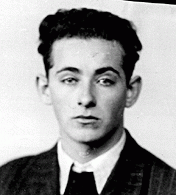
Martin Weiss
Born: January 28, 1929
Veľká Poľana, Czechoslovakia
Martin was one of nine children born to orthodox Jewish parents in Veľká Poľana, a rural village in the Carpathian Mountains. His father owned a farm and a meat business, and his mother attended to the children and the home. Everyone in the family helped take care of the horses and cows.
1933–39: Martin attended the village's Czechoslovak schools, which were quite progressive. Like many of the other children, he looked forward to leaving the provincial life in Veľká Poľana. In 1938–1939, his life was changed dramatically when Nazi Germany and its allies dismembered Czechoslovakia. Hungarian troops occupied Veľká Poľana, and Jews were subjected to discriminatory legislation. The Czechoslovak schools were closed, and the students had to learn Hungarian. The villagers all resented the new rulers, and the democratic freedoms that they had enjoyed in Czechoslovakia disappeared.
1940–44: After Nazi Germany attacked the Soviet Union in 1941, conditions in Veľká Poľana worsened. Hungary was an ally of Nazi Germany and joined in the invasion. Two of Martin's older brothers were conscripted into Hungarian forced-labor battalions. The family soon learned that some Jews from the area had been deported to German-occupied Ukraine where they were killed in mass shooting operations. In March 1944, Germany occupied Hungary and several weeks later, Hungarian gendarmes transported the village's Jews, including Martin's family, to the Munkács transit ghetto. In May, they were deported to the Auschwitz-Birkenau killing center. There they underwent a selection process. Martin, his father, brother, two sisters, and two uncles were selected for forced labor. Martin's other family members, including his mother and two younger sisters, were sent to the gas chambers. Martin and his father were sent to the Mauthausen concentration camp, and then to the subcamp of Melk, where they were forced to build tunnels into the side of the mountains. His father died there.
Martin was liberated at Gunskirchen, a subcamp of Mauthausen, by US troops in May 1945. He returned to Czechoslovakia, where he found some surviving family members. In 1946, Martin and two of his siblings immigrated to the United States.

